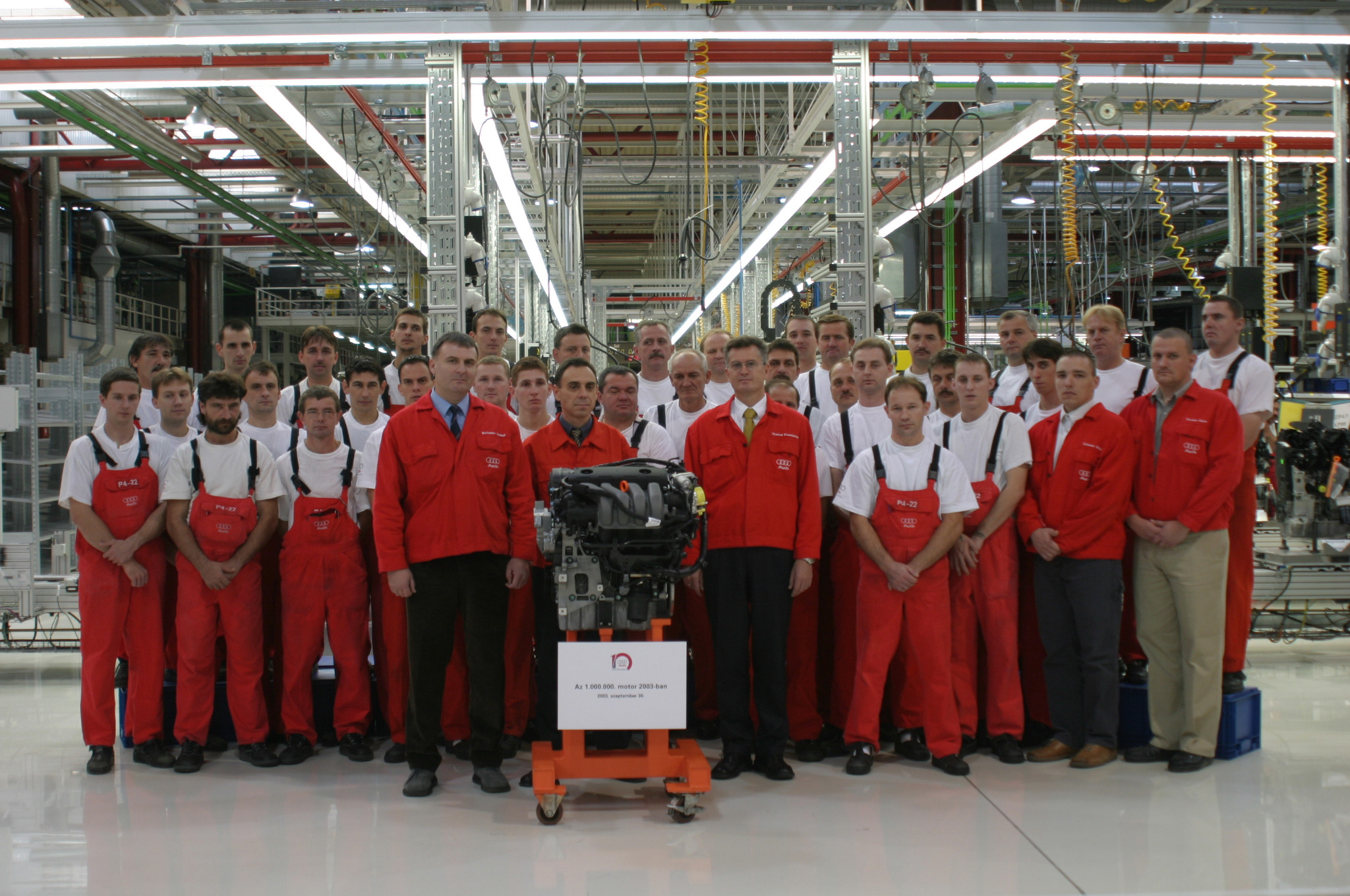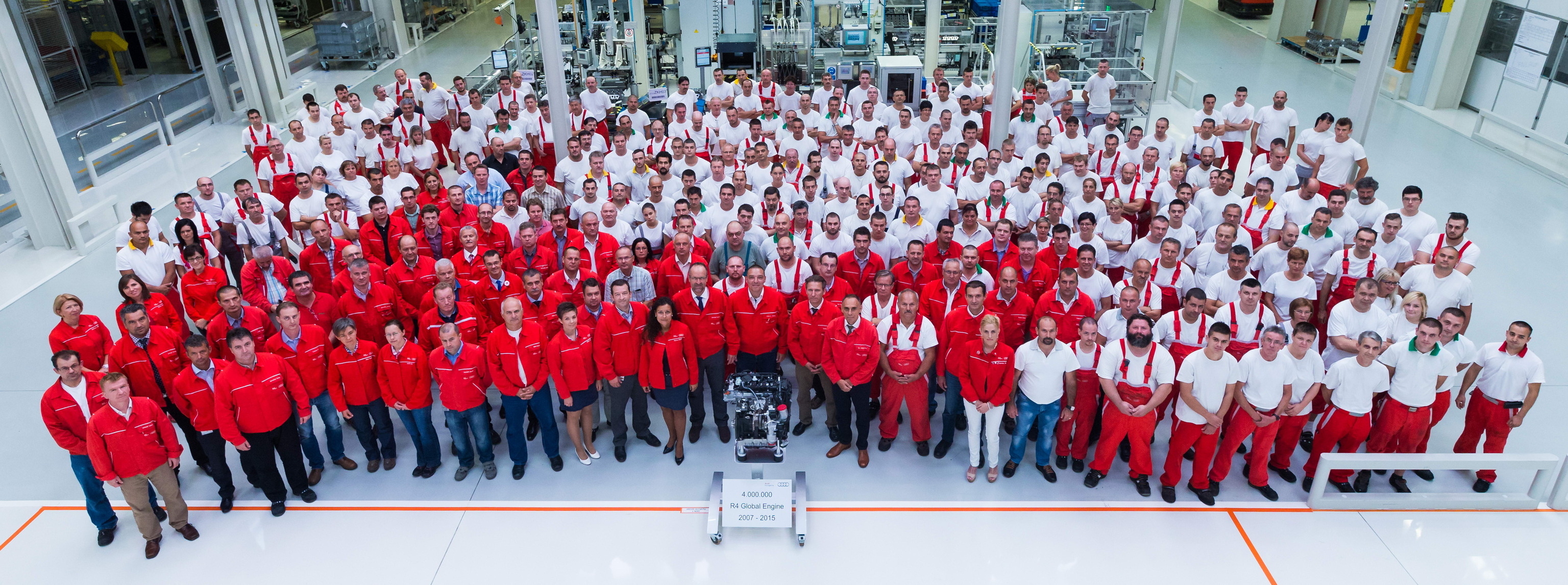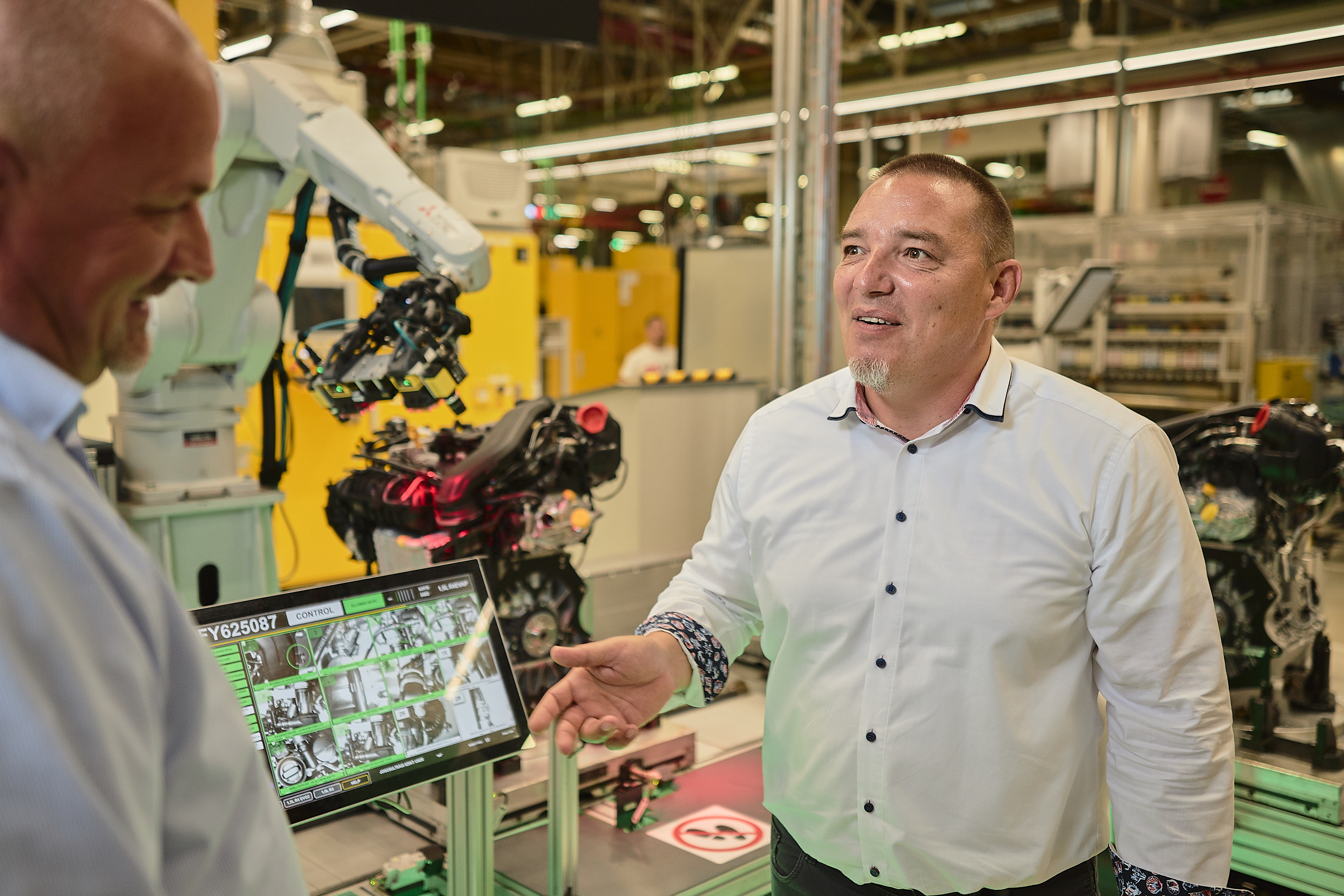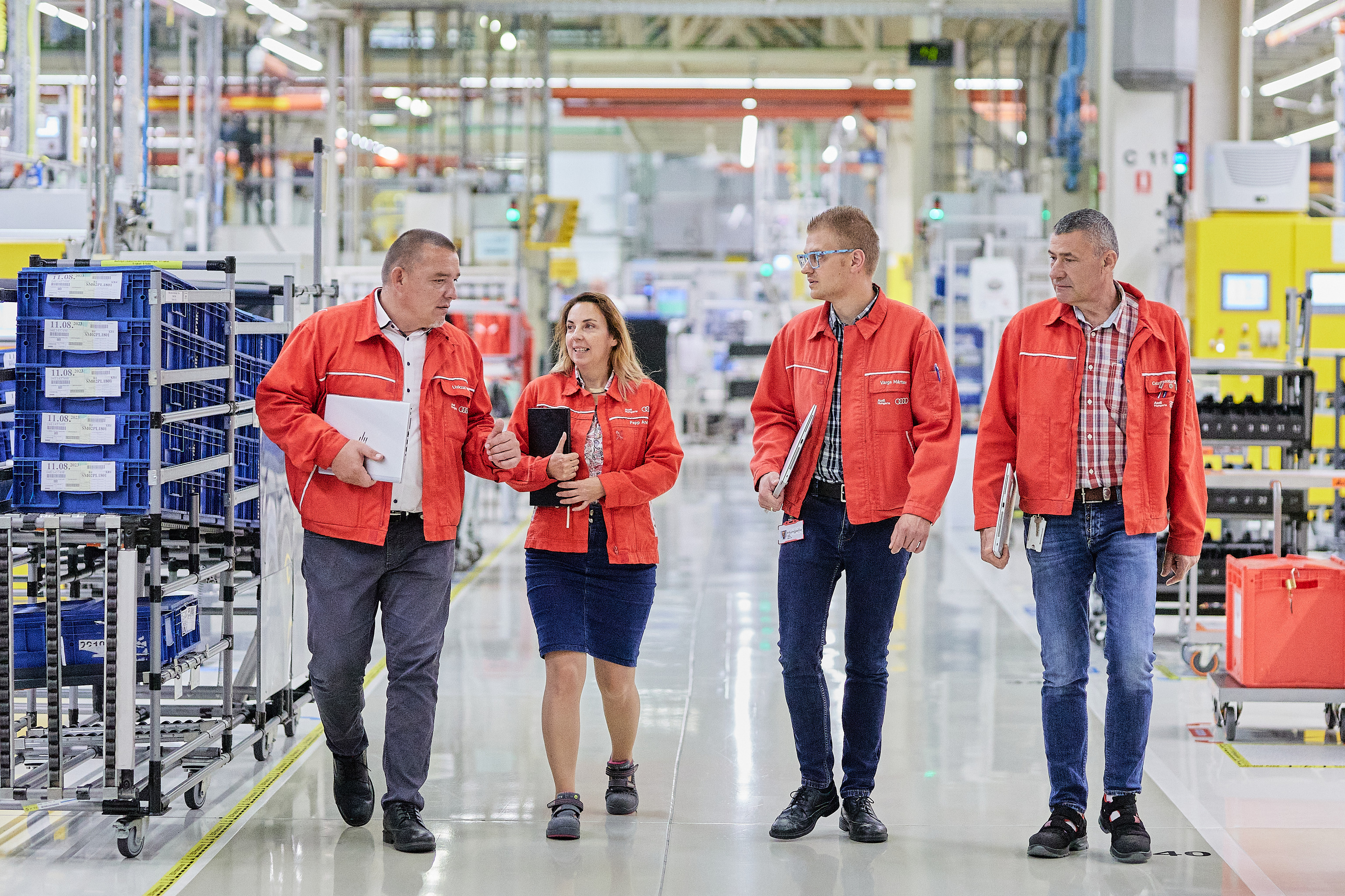2023. 09. 04.
Over the last 27 years, many of us have had the chance to work with Miklós Liziczai as one of the leaders at our company. His is a real success story, and he has told us in detail about the best moments of his years at Audi.
Few people know that in addition to starting his career as a technician on the plant’s first engine assembly line, Miklós was also Audi Hungaria’s first shift manager. He graduated from university while working, represented our engines in Wolfsburg at the quality assurance department for many years, was instrumental in building and ramping up our Global Engine powertrain line and, in addition to his vast experience with engines, also worked in the vehicle factory for many years.
Find out more about his story.
What comes to your mind when you hear the word “timing belt”?
Liziczai Miklós: The first thing that comes to mind is definitely my initial years at Audi. I joined the plant’s first engine assembly workshop on 1 March 1996. Back then, Audi was a new company in town, bringing the spirit of the West and as a junior entrant I was happy to work for such a modern company. As a qualified automotive technician, I worked as an assembly line worker for “complete engine team 2”, where the drive train and the timing belt were fitted on 900 units per shift at the time.

The first thing I had to do was to master the technique of putting the timing belt on so that it didn’t get blisters on my hands. This was a nice challenge back then, and of course it took weeks before I was able to learn the installation tricks from the “old hands” who had worked there for a long time. I was proud that after 2-3 weeks, the after-shift periods were no longer about nursing the blisters on my hands (he laughs). By the way, I could still put the timing belt on at any time, maybe even with my eyes closed.
When did you decide to go to college?
M.L.: When I started on the assembly line, my clear and unambiguous goal was to do well and do well. After 8 months, I became a team coordinator; they probably already saw that I was capable of managing a team. However, I soon realised that if I do not continue my studies and get a higher education qualification, it would be a major obstacle to my professional development. Then was when I decided to enrol in college part-time while working. I always did my best in the team and kept reaching higher professional levels, so I managed to graduate with an Audi study contract.
Back then, starting a college while working was a very motivating thing to do. It felt good that once word got out at the factory, at least 3-4 colleagues from the unit also enrolled in college.
Were you really the first shift manager at the company?
M.L.: Yes, I was. During the first two years of my career at Audi, the role of shift manager didn’t exist yet. At the time, object managers worked shifts, so they were also the shift managers. When it became clear that this was not the ideal long-term solution for production, a pilot programme was launched.
In 1999, I was the first direct employee in the history of Audi Hungaria to test the legitimacy and possibilities of the shift manager function.
I started working as a shift manager in 1999, and from 2000 I officially took on this role independently
It was a source of great pride for me, as the most talented team coordinators were selected, who then managed production independently. This was a very big deal, even at the time. Everyone is happy and satisfied when their work is recognised and when their employer offers them prospects for the future. In that spirit, I tried to stand my ground and show what I was capable of. Back then I was 24 years old, but I wasn’t scared of the task; in fact, I enjoyed it quite a bit. I knew my team, I knew the production line, I knew who could do what, so I didn’t feel under pressure.
I knew that I was responsible for the team, but I also knew that we could do it together. And we met all the expectations.
What was your first engineering job after graduating?
M.L.: After my final exam, I continued to work as a shift manager for a while, then I was approached by the production line manager of the then-starting Global Engine product range with my first engineering opportunity. His job was to design and build the production line and he asked me to work with him on that. It was a very nice challenge, and we built the Bock Montage line together with 10-15 people.
This was a completely new role, but I was able to make good use of my past experience with assembly lines. We were tasked to design the production line layout, select the staff, develop the training concept, launch, stabilise and then ramp up production on the line. It was a broad perspective to work on with a great team.

You acted as a “forward outpost” in Wolfsburg. What did this mean exactly?
M.L.: I was “stationed” in Wolfsburg for 2 years as a resident engineer in the quality assurance unit. We had a lot of our engines delivered there from Audi Hungaria at the time, and if there was any issue with any of our engines, it was my job to solve the problem together with my colleagues in Győr. I acted as a sort of forward outpost in Germany for Audi Hungaria’s product quality assurance. I was the single representative of Audi Hungaria there. Whatever I said or did in Wolfsburg was Audi Hungaria’s opinion and doing, so it taught me to assume an even greater level of responsibility and autonomy.
I never doubted that my main goal was always to represent Audi Hungaria at the highest possible level, to maintain good relations with my colleagues and, of course, to have fun and improve my language skills.
For me, it was always important to find the perfect middle ground so that both Audi Hungaria and the customer were satisfied. My aim was to balance the actions I took and the measures generated as a result of my work to the satisfaction of both sides.
How did you return to the complete engine department?
M.L.: I had to return to Hungary earlier than planned because I was offered an opportunity to work as an acting manager in the unit where I started as a production line worker, at the old timing belt assembly shop, the first engine assembly workshop of the plant. I didn’t have to think about it for a minute whether to take the offer or not as I had a great deal of experience with the line and the managing teams and this was a huge professional recognition for me.
In mid-2008 I came home and took over the operational management of the unit. I had many colleagues here with whom I used to work together as a line operator, team coordinator or shift manager. I felt that I was met with some reservations, yet ultimately with deep trust. I was not a stranger, but rather their former colleague who was put in charge of them. They knew what my expectations were, what was important to me, what my values were. There was no surprise factor.

In fact, even to this day, it is a huge advantage that I started my career as an assembly line worker. It was a long time ago, but you never forget what happens on the line. I can put myself into any situation as a staff member, a team coordinator or a shift manager. When there is a crisis, I deliberately draw on my past experiences, so it’s much easier for me to think as a team, to help, because I’ve been through this in more than one role.
I completed the AC at the end of 2010, so I officially became the manager in July 2011. In March 2015, I was asked to lead the large assembly workshop of the global engine unit under segment manager János Csóka. Over those 5-and-a-half years, I had times when 1040 staff members reported to me. I was in charge of the unit until October 2020.
Why made that period so special?
M.L.: It was a creative time for Audi Hungaria, we had a lot of projects in automation. That’s when robotisation was truly introduced. We were able to do things that were very innovative and forward-thinking, enabling us to increase production efficiency.

I also have a degree in computer science, which was a good foundation for me to keep up with the development of digitalisation. I was able to code and create databases.
This was a great help in taking our production in a constantly developing, innovative direction.
We have achieved a great deal. For example, we introduced robotic 3D scanner-based inspection instead of human inspection, we had robots clean the pallets that transported the engines instead of staff members, we used a sniffer robot to check the air tightness of engines, which a colleague and I invented and was later introduced by other manufacturing units.
We had the opportunity and the freedom to act on our own. Innovation was very much at the forefront in our activities, and we managed to accomplish some truly great things in this period.
At the time, the focus was on this assembly line. All visitor groups and delegations coming to the plant stopped by to visit us and we were proud to show them our latest innovations, up to the level of the AG Steering Committee, which was a big thing for me too.
After that, I spent 2 exciting years at the vehicle assembly unit. This was also a great period in my professional career. Many people say that there is often an invisible curtain between the vehicle and the engine factories. Not only was I able to see through this curtain but also walk right through it. I met completely new colleagues, completely new faces. I landed in a new network, so I had to find my own place in this new world. I had to build my own network. It worked out fine and I got to know really nice colleagues and build private relationships that continue even to this day.
Where are you working now?
M.L.: In October 2022, I was reassigned to the plant’s first engine workshop. In 1996, we produced the 1.8-litre turbo and naturally aspirated engines here, which is now the production area for the 1.0, 1.4 and 1.5-litre engines at Audi Hungaria. This unit is celebrating its 30th anniversary this year. I am currently the head of this assembly line. The same assembly line where I once started my career.

I know it like the back of my hand. I was a line worker here, then a team coordinator and finally, a shift manager. Truth be told, you can’t really show me anything new on this production line. The good thing about this is that in every situation I can imagine what the colleagues are talking about, what their fears and concerns are, and I can make decisions while taking everyone’s perspective into account.
This next one is a provocative question, but I’ll ask it anyway. What do you know about powertrain production, Miklós?
M.L.: (He laughs) Pretty much everything. I don’t want to sound pretentious, but I spent 25 years of my 27-year career at Audi Hungaria working on engines. I know the ins and outs of classic internal combustion engine manufacturing. Based on manufacturing processes, products or past experience, I can make an educated guess about the impact of any specific defect or symptom. However, the transformation towards the electric motor presents a huge challenge. One of my main tasks now is to gain more knowledge and experience about electric motors, so I would be prepared to deal with them in the future. The planning phase and brainstorming of a new project like this starts years before the actual implementation phase. It is important to be prepared as early as in the planning stage.
What makes yours a Four-Ring success story?
M.L.: I always wanted to do a bit more at work, always trying to improve myself. I always wanted to learn and know a little more. I tried to do my best in every position and this is where I ended up. Actually, I’ve just always been doing my job. I guess you could call that success. That is how I am going to carry on and this is my goal with my team.
The other side of the story is that Audi Hungaria has always recognised my achievements over the years. In all my positions I have had my own space and a certain degree of freedom. I am very grateful that I have been able to work independently and achieve personal fulfilment over the years. That is what I try to provide for my colleagues as well. As a leader, it is also important for me to be able to develop my team and manage our unit together with the team so that we always get better and better. I try identifying strengths and weaknesses and give my staff tasks in which they can work freely to the best of their abilities. I believe that is the way for colleagues to develop and reach higher professional levels, so I think this approach is important. If I’m capable of accomplishing all of this, it’s good for me and it’s good for the company. Maybe that’s why I can say I’m a happy person.
Address
9027 Győr, Audi Hungária út 1.
Phone
+ 36 96 66 8888
E-mail
You can read our current news on the News page.
If you need further information concerning our press materials, please, contact our colleagues at the Corporate Communication Department.